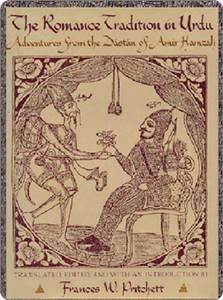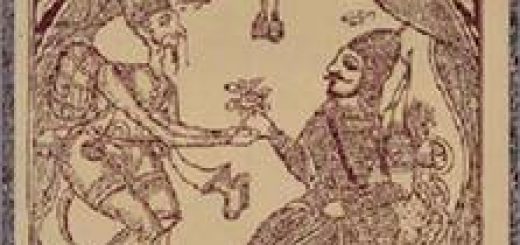Chapter 8 – [The Amir goes with Naushervan to the Garden of Justice, where ‘Amar contrives to join them.]
Chapter 8 – [The Amir goes with Naushervan to the Garden of Justice, where ‘Amar contrives to join them.]
The next day the king went to the Garden of Justice, and sent for the Amir, and arranged a seat for him near his own couch. The Sahib-qiran took ‘Adi and Muqbil with him, and presented himself before the king. He saw the garden: it was twelve miles in length and width, and delightfully overflowing with the ebullient atmosphere of spring. The description of this garden I will leave, to save time, in the hands of the qissah-khvan,/1/ for I have already praised the Garden of Justice before./2/ The Amir sat down at the king’s right hand, beside Crown Prince Hurmuz; Muqbil the Faithful and Buzurchmihr and the Amir’s other officers remained at the king’s left hand. Musicians who soothed the heart, singers with lovely voices, and dancing girls able to enhance pleasure, presented themselves. A luxurious and joyous party began, and wine-drinking started.
On the first day the king held the festivities in one of the pavilions. When the golden harp of the sun was covered, and the silver tambourine of the moon lighted the gathering, cupbearers with moon-like faces, bringing jewel-adorned cups and flagons of rose-red wine, presented themselves. Cups of purple wine began to be passed around. The king bestowed a cup of purple wine on the Amir with his own hands. The Amir made obeisance and drank it down. Now the cups went around freely, cupbearers with faces like the sun filled and refilled the cups with purple wine and intoxicated drinkers began to accept them–until once again the sun-flower bloomed in the garden of the sky, and the silver lilac, like the eye of the narcissus, lost its light. Silver-cheeked cupbearers presented themselves, bringing glasses of restorative drinks, and the thoroughly intoxicated drinkers of the inebriating wine desisted from drinking. Sweet-voiced musicians sang and played so melodiously that even the walls and doors quivered with rapture.
Now please listen to a few words about that disturber of the alert-minded ones of the age, Khvajah ‘Amar ‘Ayyar, and a few delightful sentences about the trickery and shrewdness of that prankster of the age. When he had not seen the Amir for a night and a day, ‘Amar grew anxious and left his house; searching and inquiring, he arrived at the gate of the garden. There he saw that ‘Adi was seated in an elegant chair, drinking wine, and people were placing all kinds of snacks before him. ‘Adi was eating with relish, and things were so arranged that not even a bird could fly over the top of the gatehouse into the garden, not even the bird of Thought could come anywhere near the garden. ‘Amar began asking everyone, “What is all this? The Amir is in the garden; why is ‘Adi sitting outside?” Someone blurted out, “The king has ordered that ‘Amar and Bakhtak should not be allowed into the garden, so the Amir has stationed ‘Adi at the door, to keep Bakhtak and ‘Amar from getting in.”
‘Amar, greeting ‘Adi, sat down in a chair. ‘Adi asked, “Khvajah, what are you doing here, and what’s on your mind?” ‘Amar said, “I hadn’t seen you for two days–the world was growing dark before my eyes, so I came halting and stumbling along to see you! Good fortune brought me here without much trouble. Although you’ve been ignoring me, I haven’t forgotten the esteem that I feel for you.” ‘Adi invited ‘Amar to have wine and kabobs, and placed snacks before him as well. ‘Amar drank a cup, and said to ‘Adi, “Today I bought a ruby, and I think it was a bargain. Just take a look, and make sure I wasn’t cheated.” ‘Adi was inwardly delighted: “’Amar thinks me a connoisseur of jewels, that’s why he’s come to have me judge the ruby, he’s brought such a jewel to show me!” ‘Adi said, “Khvajah, who else is such a jewel-expert as you? Who could cheat you–who would have the nerve? But anyway I’ll look, I’ll do as you wish.”
‘Amar, putting his hand in his pocket, pulled out a fistful of sand and dashed it into ‘Adi’s eyes. ‘Adi, rubbing his eyes, said, “Curses on you, ‘Amar, you’ve blinded me!” And everyone anxiously rushed to look after ‘Adi, and began to brush away the dust from his face and clothing. ‘Amar, with one bound, entered the garden and reached the lawn. ‘Adi, when he had washed and wiped his eyes, and cleaned off the dust and dirt, and when the throbbing in his eyes had lessened, grew suspicious. He asked everyone, “Where did ‘Amar go?” But no one could tell him which way ‘Amar had gone, in which direction he had vanished. ‘Adi concluded, “He’s fled because he fears me.”
‘Amar, seeing the blossoming garden, felt his heart open out and bloom, for never in his life had he seen or heard of such a garden. Strolling among the flowerbeds, he headed for the palace where the king and the Amir were adorning a gathering, and the whole company were enjoying themselves. Close to that palace, at the edge of a water-channel, was a chinar tree; ‘Amar sat down beneath it and, strumming a two-stringed lute, began to sing. ‘Amar’s singing could revive the dead, and recall the sleepers in graves to consciousness.
When the Amir heard the sound, he said to Muqbil the Faithful, “I hear a voice like ‘Amar’s, and a faint sound like that of his lute. I told ‘Adi not to let ‘Amar into the garden, not to let him even set foot near it, so how did he come here? Go and bring ‘Adi here.” The king, seeing Hamzah angry, said, “There’s no need to call ‘Adi, I forgive ‘Amar his fault. But do send for ‘Amar, tell the usher to go find him.”
The usher went to summon ‘Amar. ‘Amar said, “In a gathering of people like the king and the Amir, what use is a poor lowly ‘ayyar like me? At such a munificent party, which is all luxury and enjoyment, how can an unworthy man like me find a place? I had heard praise of the Garden of Justice, so I just came along. Sitting off in a corner, I’m watching the roses laugh, and listening to the nightingale’s tearful laments. And if I join the party, perhaps the mirror of someone’s heart might be clouded by my presence, and I might suffer at his hands. So [in Arabic] ‘Security is in being one, and calamity is in being two.’ It’s good to be alone, I like to take to a corner and be solitary and single. [Persian verse:]
To me, there’s no better paradise than privacy;
To me, there’s no worse hell than the warmth of a party.”
The usher had no choice, he went back and reported to the king what ‘Amar had said. The king burst out laughing, and all those present laughed until they rolled on the ground.
The king, holding the Amir’s hand, came out of the palace; strolling through the gardens, he made for the place where ‘Amar had seated himself and was singing. ‘Amar saw that the king and the Amir, with their party, were coming, they were heading toward him. With one bound, he fell at the king’s feet and kissed them, and blessed the king, and said, “I never thought that Your Majesty would consider me a disturber of the company, and would not command my presence in this joyous and festive gathering. And as for Hamzah, he’s a great one for kindheartedness and loyalty to his friends: he goes off alone to enjoy himself, and takes the first occasion to forget his old tried-and-true comrades!” The king laughed; seizing ‘Amar’s hand, he betook himself to the Turquoise Palace.
When the king had settled himself on the throne, he ordered ‘Amar to pour out the wine. ‘Amar began to fill and refill the cups, and to show off his clever tricks. He served as cupbearer all night, and when the pale light of dawn began to appear, ‘Amar put together his seven-part flute and played, and sang as sweetly as David, so that the king and the Amir and their companions wept copiously, and began to drench handkerchief after handkerchief. The king filled ‘Amar’s pockets and lap with pearls, and bestowed many gifts and robes of honor on him. Leaving the Turquoise Palace, the king went with the Amir and brightened with his appearance the Golden Palace, which had walls made of golden bricks and lattices hung with vines inlaid with precious stones.
Now I will say a few words about Bakhtak’s doings and amuse my listeners. When he heard the news of ‘Amar’s entry into the Garden of Justice, he was agitated, and went around obsessed by the thought, “What a calamity, that ‘Amar is in the Garden of Justice and I can’t get in there, I can’t join that heavenly gathering! Now that ‘Amar has a clear field, God knows what thorns he’ll strew in my path, what seeds of mischief he’ll sow in that garden!” With this thought, he took some bolts of velvet and gold-embroidered brocade and satin, put them in trays, and set out from his house. When he reached the gate of the Garden of Justice, he met with ‘Adi and began to say friendly things to him.
‘Adi asked, “Where are you going, and how have you happened to come by here?” Bakhtak said,”I’ve brought some gifts to offer you, I’ve come to present them to you. If you will accept them, and let me enter the garden, it will be a supreme kindness, and an act of total graciousness on your part.” When ‘Adi heard these words, he grew extremely angry and said furiously, “Bakhtak, you wretch! It’s your evil destiny that’s brought you here! You think me so corrupt that you can bribe me and get into the garden! If you value your honor, take yourself away from here, otherwise I swear by the head of the Amir that I’ll put you to shame: I’ll have the guards take you by the scruff of the neck and throw you out!”
Bakhtak, downcast and unsuccessful, went home, and spent the day lamenting. When night came, he covered himself with a felt rug, and with his clothes in a bag under his arm, sneaking along furtively like a thief, keeping out of sight of the guards, he arrived beneath the wall of the Garden of Justice, and threw his bundle into the garden, and himself slid in through a drainage gutter.
Please hear about Khvajah ‘Amar: in the Golden Palace he was acting as cupbearer to the king, he was filling crystal goblets with rose-red wine, when his ribs twitched, and the fire of mischief flared up in his heart–that is, he reflected, “In just this way Gustahm too feasted the Amir, and seemingly showed complete hospitality and affection for him. May this not be the same situation, and the same kind of feast! I must just discreetly take a turn around, and have a look at things here and there.” With the excuse of a call of nature, he left the Golden Palace. Wandering along the paths, strolling in the gardens, looking around right and left, he arrived near the gate.
‘Adi was just then saying to someone, “Today Bakhtak came and tried to bribe me; he took me for a traitor like his father, who could be bribed to let him into the garden!” When these words reached ‘Amar’s ears, he realized with a start, “Since Bakhtak came here with that intention, he’ll certainly enter the garden somehow or other!” He began to examine everything, shrub by shrub, flower-bed by flower-bed, plant by plant, and to search through everything, path by path, trail by trail, garden by garden. Suddenly his eye fell on a bag; he discerned its possibilities. From a distance he could see that the bag was lying under the wall of the garden, tied tight and very full of clothing, etc. Opening it, he discovered Bakhtak’s clothing.
‘Amar had obtained the wish of his heart, he was in ecstasy, he could hardly contain himself. He hid the bag in a corner under some leaves, and began searching: “Now, how could a thief find entry into this garden? People are so well protected here that a thief would be killed at once.” When his eye fell on the gutter, he looked carefully, and saw somebody stick his head out and look all around, then pull his head back again. He decided, “It’s definitely Bakhtak, that ingrate!”
Going to Khvajah Alfalfa-robe, who was chief of the gardeners, he said, “You are negligently having a cozy sleep, while a thief is trying to slip into the garden through the gutter! I heard a footfall and came to tell you. Knowing you as a prudent man, I came to warn you secretly out of affection. Now it’s up to you: you know your job, you know the king’s arrangements. If anything untoward happens, then in the morning–there’s you, and there’s a prison cell, and you’ll see what garden you’ll be tending!”













